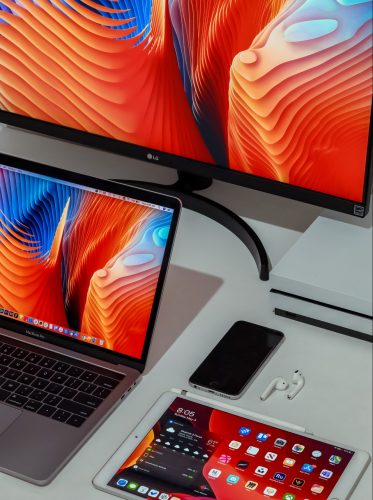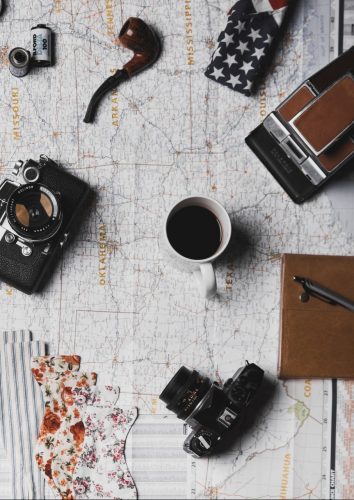A semester abroad or Erasmus study is the dream of many students. And for good reason. After all, you will learn a lot and reminisce for the rest of your life. But the last few months before departure are stressful for most students. After all, there’s a lot to organise before you go. With our semester abroad checklist, you’ll get some important pointers on what to look out for during the planning phase. Our semester abroad packing list also tells you what you shouldn’t forget.
You need to think about many different things when studying abroad and, above all, you need to start planning early enough. This is especially true if you live and study outside the EU. Some tasks need to be taken care of a year before you leave, such as meeting the deadlines set by the foreign university or making financial arrangements. Waiting for important documents just before departure is not only a big stress factor, but also jeopardises your semester abroad. Many things require some lead time, especially if you have to deal with the authorities.
Our tip beforehand: Put together all the items that are important to you and that you need to think about now and shortly before your trip. With our checklist, you’ll get off to the perfect start for your semester abroad. This will help you keep track of everything and prevent your studies abroad from turning into chaos in the first place. This is guaranteed to make you look forward to your semester abroad adventure.
Before your trip begins, you need to make some preparations and organise important documents. Some of the following points should be addressed early on, because you have to take into account cancellation deadlines or waiting periods. You should also not neglect the documents for the foreign university. This includes the Learning Agreement for your Erasmus stay and perhaps language skills that you need to polish as an admission requirement. Universities also have an international office that helps students with their semester abroad. You can find a checklist for the time before your stay here:
Right before you leave, there is often a lot of excitement. It is therefore all the more important that you have all the important points in mind. If you live in a modern flat from MILESTONE, your departure is quickly arranged. Thanks to the fully furnished apartments, you can save yourself the trouble of lugging furniture around. So moving in and out is a snap.
If you live in a shared flat, you may have to look for someone to move in as a temporary tenant. Start looking in good time. In that case, you’ll need somewhere to store your personal belongings before you leave. You may also want to make a big cut in your life and look for a new tenant right away.
And if your flat or flat is simply empty for the duration of your semester abroad, you must leave your accommodation in a holiday-ready condition before you leave. This includes the following points:

The following travel documents are essential to have in your backpack before you leave. To be on the safe side, make a copy of important documents such as your passport and keep them in a separate place. These documents are the most important for your trip:

For a semester abroad, you not only need enough money, but also access to your bank account. Before your trip, check how you can withdraw cash and that your financial cushion is large enough. Of course, the price level in your host country plays an important role. Find out what it costs to live in the country you are visiting. But don’t forget that you will spend more money in the country because you will be going on excursions and perhaps travelling. After all, most students want to get to know the country and its people, and that costs money.
Grants and scholarships are important financial support that you should look into right away. You should also take the following things with you on your trip:
How do you pack a suitcase if you’re not just going away for a fortnight, but need to take along belongings for an entire semester? Our tip: Prioritise and write down the most important things. A list will help you decide what you absolutely need in your suitcase and what you can safely leave at home. Because space is very limited during a stay of several months. By making a list, you reduce the risk of forgetting something important at home. It also makes it easier for you to decide whether you really need a large suitcase or whether you should go for a trekking backpack.
When flying, you also have to consider the luggage limits and book additional luggage in advance if necessary. If you need to take a lot of material with you to the university abroad, for example books, you can send them in advance by post. If you are flying, stow important documents, underwear, a change of clothes, medication and a toothbrush in your hand luggage. That way, you’ll be prepared in case your suitcase gets lost.
Here is our list of luggage and suitcases:
There are a few items you should always have on hand when you travel. These include blister plasters or band-aids for minor injuries. Depending on the country you are travelling to, you may need to stock up your first-aid kit, for example with anti-diarrhoea tablets. Of course, sufficient quantities of regularly needed medicines should be included in your hand luggage.

You will be able to buy most personal hygiene products in your host country. However, this is not always the case and depends on the conditions in your host country. There are differences, for example, in the area of feminine hygiene. If you want to be on the safe side and don’t want to do without your favourite items, these should be added to your list right away. These include:

Of course, you will need a laptop for your studies. In addition, it depends on your preferences and inclinations which electronic items you absolutely need to take with you. But don’t forget your smartphone at home! By the way, you can make maps available offline on Google Maps so that you don’t have to rely on Wi-Fi and can find your way around right away. In addition, you can take these electronic items with you:
Familiarise yourself with the climate and cultural conditions before you leave. If you are studying outside the EU, there will quickly be cultural differences in terms of clothing style. Freedom of movement is not welcome everywhere and you should stick to this.
Also, familiarise yourself with the leisure activities available in your host country. Even if you are visiting Portugal in winter and can look forward to many hours of sunshine, you must remember to bring a thick jacket. Otherwise, the following items should be on your list depending on the season and climate:
Maybe you have a few items and favourite pieces that you are particularly attached to. They remind you of your loved ones even when you are thousands of kilometres away and make saying goodbye a little easier. The following aids can make many a situation easier on the journey and on site. These include:

Studying abroad is not a problem despite Corona, even if the pandemic does thwart some plans. But don’t get discouraged and stay optimistic. Find out about local policies and regulations regarding vaccination status and restrictions. You should also have the following items handy for your trip:
The items you actually need depend on your host country and your preferences. Still haven’t decided where to go? Then read our article on the best cities to study in. Get inspired and go on an adventure.